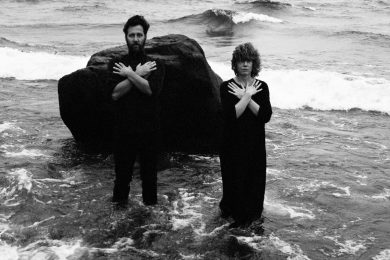 Erika and Simon Angell refuse to fall into the trap of music that becomes a habit, a routine, or a repetition. Their duo project Thus Owls has found a way to re-invent itself, album after album, for nearly 15 years. Their double-album Who Would Hold You If The Sky Betrayed Us?, released on March 4, 2022, explores even further the unbeaten path where they’ll most likely never set foot again.
Erika and Simon Angell refuse to fall into the trap of music that becomes a habit, a routine, or a repetition. Their duo project Thus Owls has found a way to re-invent itself, album after album, for nearly 15 years. Their double-album Who Would Hold You If The Sky Betrayed Us?, released on March 4, 2022, explores even further the unbeaten path where they’ll most likely never set foot again.
This fifth project is fraught with so many elements, launched with the deep ardour of true artists, that it’ll always be a little idealistic to pretend that they can ever play the same songs in their original form. “We love that space where compositions and improvisation meet. And what we love even more is blurring the line between the two,” says Erika. Simon adds, “For our first album in 2009, when we still had our Swedish band, that was our vibe. Full circle.”
Founded in Stockholm, Thus Owls have been based in Montréal for many, many years, now. And yet, the pandemic has sown seeds of doubt that can be heard in Erika’s lyrics throughout the album. “My words are my own, they’re my diary,” she confesses. “I write for months on end, then look at what I wrote. I like improvising melodies in that second phase.
“For the new album, I wanted to find out how I felt about uprooting myself. Being disconnected from my family, my home, and even more so because of the pandemic – it changed me. Not all humans have to speak a language that’s not their mother tongue, day after day. I wanted to know who the uprooted me is, and that’s what I sing about here.”
If you don’t hear much of the Thus Owls sound in Québec, it’s not necessarily because it’s the Swedish sound, but rather because they embrace a broader musical ideology that shapes musicians there. “It’s free jazz,” Erika suggests initially. Says Simon, “To be more precise, a lot of different styles will incorporate some sort of jazz improvisation over there, whether it’s pop, rock, contemporary.” Erika adds, “All of my friends I went to school with 20 years ago now approach music with a greater fluidity in mixing genres. We have an urge, and you can hear it, to avoid pigeonholing anything. Music doesn’t need to have a name.”
While their whole creative process seems to have been born in the heart of a fanfare in a sold-out stadium, the last two years have instead brought the Angells back to a dense and multi-faceted expression of their music, standing in front of almost nothing.
“When you play for a large crowd, it brings out the fun, it opens the door to possibilities and, yes, that’s how we like to think of our music,” Erika elaborates. Simon says, “What’s really interesting about our new album, however, is that even though we’ve managed to invite friends to play with us [including the three saxophonists Claire Devlin (tenor), Adam Kinner (tenor) and Jason Sharp (bass sax)], the album is built so that we can always invite someone else to the stage on the road. It’s the very essence of this project: freedom.”
When they’re in the studio, it’s very common that the first take is the one, and they “definitively never do more than two or three.” “A song’s energy is like a flame,” Erika surmises. “After three takes, the fire is gone. So, when we’re in the studio, we all play together in the same room, except for me; I’m in the vocal booth. We light up together, and we record as best as we can exactly how we would play onstage.”
When the pandemic struck, Thus Owls were finalizing the music for the movie Woman In Car. Their song “Lovers Are Falling” is nominated at the Canadian Screen Awards in the Best Original Song category. This type of project takes the couple out of its usual workflow. “You need to conceive music differently,” confides Simon. “The accent isn’t on the music. You need to reel it in.” Erika adds, “When I compose, I see colours in my mind. In the case of film music, the colour palette is already there, you just need to draw the contours.”
Thus, in spite of the heavy sounds and complex, multi-layered arrangements, Thus Owls travel lightly: a simple starting point that gets painted with all the possibilities found along the way. “We decide to listen to ourselves,” says Erika adamantly. “We bow to the unpredictable.”